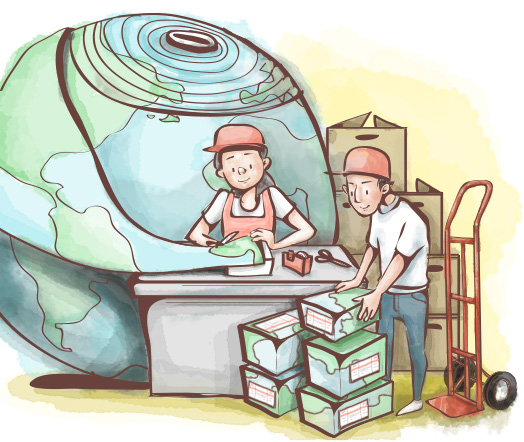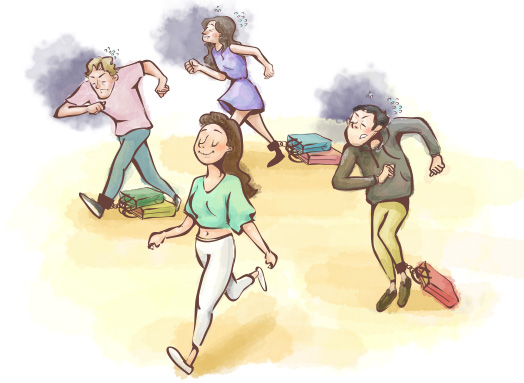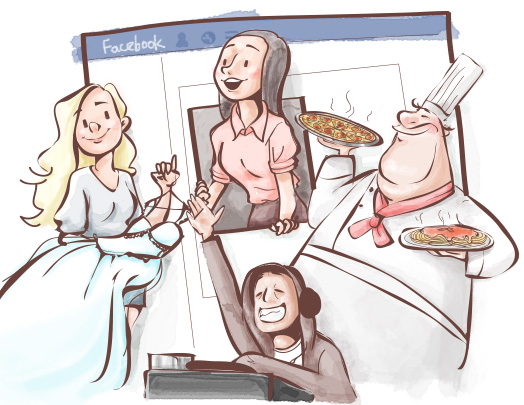Buy Less, Live Better
From Singles’ Day to Thanksgiving Day, from Christmas to Chinese New Year, every turn of the year not only ushers in the festive season, but also marks a time of discounts and sales far and wide. While knock-down prices and buy-one-get-one-free offers are hard to resist, how many of the bargains we get from these price wars are really what we need instead of reminders of impulse buying?
Indiscriminate consumption, however, does not merely mean a few more unused clothing items in the closet that will never see the light of day again. The real issue underlying the tens of billions worth of sales on the ‘Double 11’ Day is that it will take a century for the tonnes of cartons, polyfoam and bubble wrap used for product packaging to biodegrade, not to mention the environmental pollution caused by the logistics and transportation involved.
Every buying spree will spell disaster for planet Earth. Fortunately, as more and more people begin to realize the downside of compulsive buying, all kinds of anti-consumption movements have been springing up across the world.


Buy Nothing Day
Movements to curb materialism date back to the early 1990s. Launched in Canada in September 1992, the first ‘Buy Nothing Day’ urged people to rethink their consumption habits and avoid falling prey to consumerism.
By 1997, ‘Buy Nothing Day’ in North America has become an annual event held on the day following Thanksgiving Day to fly in the face of Black Friday when major department stores in the US vie to whip up a retail frenzy with huge discounts.
From Sweden to New Zealand, and from Norway to Japan, ‘Buy Nothing Day’ is now held worldwide in some 65 countries, featuring such events as cutting up credit cards and playing zombies dashing about in shopping malls, or pushing empty shopping carts around in parades.
‘Buy Nothing New’ Month
In 2010, Tamara DiMattina, a resident of Melbourne, Australia, went one step further by launching the ‘Buy Nothing New’ Month for the entire month of October, promoting the philosophy of living more with less.
Throughout the 31 days of the month, participants are called upon to limit all their spending to just food, hygiene products and medicine, and recycle used items, buy second-hand, resort to barter, or share their stuff with others.
In an interview with news.com.au last year, DiMattina, who had bought nothing new for 10 years, said, ‘I don’t have this miserly, stingy life. I have a wonderful, full life, but I just don’t need all the stuff that advertising constantly tells us that we need. More people are discovering that the alternative to wasteful, mindless consumption is a happier, more calm, more connected and meaningful life.’

Buy Nothing Project
In July 2013, a group of Bainbridge Island residents in Washington State, US, initiated the ‘Buy Nothing Project’. Its objective is to make ‘buying nothing’ a daily habit throughout the year using the support of the local community.

Statistics show that, by early 2015 in North America, there were already 580 social groups rallying around the Project, communicating mainly through their respective group pages on Facebook. By exchanging messages on a group page, group members can give away, lend or share their unused stuff, seek help or borrow the things they need without conducting any business transaction or involving money.
Apart from minimizing waste, more importantly, the ‘Buy Nothing Project’ has also fostered interpersonal trust and fellow feeling. On her wedding eve, Marquessa Pinder from Washington State’s Kirkland sought to borrow a dress for the ceremony by posting on the Facebook group ‘Buy Nothing Kirkland’. The response from the group members was overwhelming. Not only did the bride and bridesmaids get their elegant gowns, but also a free wedding venue, complete with bouquets, an Italian buffet, photography, DJ and childcare services. Previously strangers to the couple, the group members who had chipped in all attended the wedding, making it a most heart-warming occasion.
Sales promotions are hard to ignore. However, the more we buy, the more waste we will have to discard and the more pollution we create. To rein in materialism, help protect the environment, and experience community economy and the culture of sharing at the same time, why not go to CU Happy Corner and exchange your Time Credits for products or services? Alternatively, you may want to scout for some good stuff for free on the CU Ling Facebook group page, which offers warm community support.


